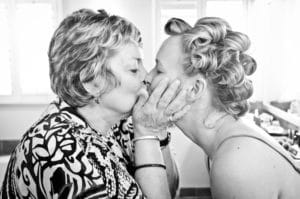The most important person I ever lost


Losing my mom, the great love of my life, was terrible. Her name was Mimi, where was no one like her, she was everything. Even though her actual death was as peaceful as she would’ve wanted (and as a former Executive Director of a hospice, this was of utmost importance to her), the shockwaves of grief unmoored me. Two questions haunted me day after day, as I tried to keep being a present mom to my own little daughters: 1) how can life ever been as good as it was with her in it? 2) how can people walk around drinking coffee and smelling flowers, totally oblivious to the earthquake and the tragedy that has occurred?
In my darkest moments, I felt unbearably far from her and grasped for ways to keep her close. I feared her drifting further and further from my post-Mimi life, and that my kiddos wouldn’t remember her.
Ritual and ceremony brought me back to level, stable ground by providing a real and tangible way to feel like her legacy continued. My challenge was to find ways to connect to her wisdom and her spirit, as often as I could. Basically I decided there was no moving “on” from losing her, only moving forward.
First, I began “Mimi Wednesday”. This involved the continuation of a tradition she created when I had my twin babies. She was very clear that her time was limited with them, and she would travel 4 hours round trip to spend time holding, burping, feeding and marvelling in my children “come hell or high water”. Only twice in their little lives did she miss a Wednesday – once for chemo, once for a snowstorm (which she needed to be talked out of braving). Every Wednesday thereafter, I seek to honour our connection, and one of her greatest life lessons, which is to put myself first. It wasn’t until her cancer diagnosis that she truly felt permission to say NO, and to assert her own wants and needs, sometimes over others’ expectations and requests. On Wednesdays I do something to connect with the wisdom that life is too short to squash my own desires. I do things like: drink tea and read in a coffee shop, have an uncomfortable but honest conversation, nourish my body with movement or immerse myself in something that can feel selfish, but fills me up. I think of her every Wednesday at some point in the day, and I feel as if I’m furthering her legacy and her wish for me.
Second, I began collecting a glass bowl of “thoughts”. I write down on pre-cut pretty paper (all shades of blue, her favourite) a thought I have about her. It usually is a memory, or a sensation, or something I wish she was here to witness, or even something as simple as a tidbit of my day I wished to tell her. We talked on the phone constantly, so not sharing my life with her feels like a massive gaping hole. This ritual of writing when the moment strikes (sometimes a few at once, sometimes I go months without writing) serves as the ongoing conversation we are having in this grieving experience. One day I imagine reading all the notes to myself, or to my girls, or grabbing one out of the bowl when I’m having a tough moment.
Finally, I talk about her. I am not shy to constantly share her Mimi-isms to friends (e.g. “feelings are facts”, “marriage is an ongoing conversation”, “motherhood expands your range of all emotions – from rage to deep love” – there are many many many more). I bring her up in conversation, I talk to my kids about her all the time, so much so that they talk to her as well since they believe she lives in their heart. Kids, being the literal little nuggets that they are, will turn their faces down and whisper sweet nothings into their heart, or will ask her about the weather or her thoughts on a certain topic. It keeps her alive for me to see and witness her embraced by the people I surround myself with. When my partner asked me this past Mother’s Day, what was the best thing Mimi taught you, I had a full body reacting of pride and love, knowing that he can’t think about my motherhood without considering her impact.
For me, using these rituals to honour my mom has brought an unexpected richness to the process of grief. It’s allowed me to integrate the experience of having her in my life, and living without her, into something I can practice and come back to whenever I need it.
